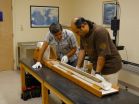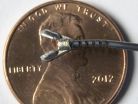Most women are post-menopausal when they develop breast cancer, and breast cancer is usually found early, when surgery can remove all detectable disease, but might leave dangerous undetected micrometastases (small secondary tumours). About 80% of breast cancers are hormone sensitive (ER-positive), which means that they can be stimulated by the body's own hormones, such as oestrogen. Endocrine treatments, which act to stop hormones stimulating cancer cells, can help protect against breast cancer recurrence.
The Early Breast Cancer Trialists' Collaborative Group (EBCTCG) is a worldwide collaboration set up 30 years ago by researchers at the University of Oxford, Oxford, UK to bring together every few years all the evidence from randomised trials on the treatment of early breast cancer. The two reports published today [Friday 24 July, 2015] provide the best evidence yet for the effects of AIs and bisphosphonates on postmenopausal women with early breast cancer.
The first study brings together evidence from 30 000 postmenopausal women in 9 randomised trials, showing that 5 years of treatment with the newer endocrine therapy (ie, an AI) produces somewhat better survival than five years of standard endocrine therapy (tamoxifen). Compared to tamoxifen, taking AIs for five years further reduced the likelihood of the cancer recurring by about a third (30%), and the risk of dying from breast cancer by around 15% throughout the decade after beginning treatment. The researchers estimate that, compared to no endocrine treatment, the risk of dying from breast cancer for women who took AIs would be reduced by around 40% in the decade after beginning treatment.
According to the AI study's lead author, Professor Mitch Dowsett of The Royal Marsden and The Institute of Cancer Research, London, UK, "Our global collaboration has revealed that the risk of postmenopausal women with the most common form of breast cancer dying of their disease is reduced by 40 per cent by taking five years of an aromatase inhibitor - a significantly greater protection than that offered by tamoxifen. The impact of aromatase inhibitors is particularly remarkable given how specific these drugs are - removing only the tiny amount of oestrogen that remains in the circulation of women after the menopause - and given the extraordinary molecular differences between ER-positive tumours. But aromatase inhibitor treatment is not free of side-effects, and it's important to ensure that women with significant side-effects are supported to try to continue to take treatment and fully benefit from it."
The second study brings together evidence from another 20 000 women in 26 randomised trials, showing that 2-5 years of treatment with a class of drugs called bisphosphonates, which are usually used to treat osteoporosis, reduces the risk of breast cancer recurring in post-menopausal women, and also significantly extends survival. However, bisphosphonate treatment appears to have little effect in premenopausal women.
The most common site for breast cancers to spread to is bone. Tumour cells released from the primary breast cancer can remain dormant in the bone for years before spreading to other parts of the body. Bisphosphonates alter the bone microenvironment, which could make it less favourable for cancer cells and so reduce the risk of cancer recurrence in the bone and in other organs. Taken separately, previous clinical trials of bisphosphonates in early breast cancer have shown mixed results, but taking all their results together, a clearer picture emerges.
The meta-analysis included individual patient data on 18 766 women in 26 randomised trials, comparing between two and five years of bisphosphonates versus no bisphosphonate. In the overall study population, the only clear benefit of bisphosphonates was a 17% reduction in recurrence of cancer in the bone. However, among postmenopausal women, bisphosphonate treatment produced a larger reduction in bone recurrence of 28% and also reduced the risk of dying from breast cancer by 18% during the first decade after diagnosis [2].
This benefit appeared to be irrespective of the type of bisphosphonate, treatment duration, how big the tumour was, whether it had spread to the lymph nodes, or whether or not it was oestrogen-receptor (ER) positive. However, bisphosphonate treatment did not reduce the risk of new breast cancers developing in the opposite breast.
According to the bisphosphonate study's lead author Professor Robert Coleman, from the University of Sheffield, UK, "Currently, bisphosphonates are mainly used to reduce bone loss and fractures in postmenopausal women and to reduce bone complications in advanced cancer patients. Our results show that adjuvant bisphosphonates in postmenopausal women prevent around a quarter of bone recurrences and one in six of all breast cancer deaths in the first decade of treatment. These simple, well tolerated treatments should now be considered for routine use in the treatment of early breast cancer in women with either a natural or medically induced menopause to both extend survival and reduce the adverse effects of cancer treatments such as the aromatase inhibitors on bone health." [1]
Professor Richard Gray, from the University of Oxford, UK, who was the lead statistician for both studies, comments that, "These studies provide really good evidence that both of these inexpensive, generic drugs can help to reduce breast cancer mortality in postmenopausal women. About two-thirds of all women with breast cancer are postmenopausal with hormone-sensitive tumours, so could potentially benefit from both drugs. The drugs are complementary, because the main side effect of aromatase inhibitors is an increase in bone loss and fractures, while bisphosphonates reduce bone loss and fractures as well as improving survival."
INFORMATION:
NOTES TO EDITORS:
Both studies were funded by Cancer Research UK and the UK Medical Research Council.
[1] Quotes direct from authors and cannot be found in text of Article.
[2] The absolute reduction in the risk of death from breast cancer at 10 years was 3·3% with the use of bisphosphonates (10-year risk 14·7% vs 18·0% for women who did not receive bisphosphonates).



